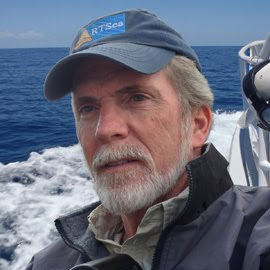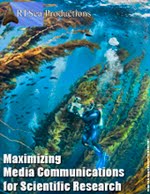 One of the ways that ocean conservation can resonate with a broad population of people is to, for better or worse, make it self-serving. In other words, show a direct link between the ocean and mankind. Those involved in ocean conservation know that there is a shopping list as long as your arm of benefits derived from conserving our marine resources, but many are the result of an inter-related domino effect and sometimes those multiple degrees of separation can, for many people, seem obscure, thereby diluting the urgency of the cause. It becomes a bit more remote when it is a series of "if this happens, then this happens..."
One of the ways that ocean conservation can resonate with a broad population of people is to, for better or worse, make it self-serving. In other words, show a direct link between the ocean and mankind. Those involved in ocean conservation know that there is a shopping list as long as your arm of benefits derived from conserving our marine resources, but many are the result of an inter-related domino effect and sometimes those multiple degrees of separation can, for many people, seem obscure, thereby diluting the urgency of the cause. It becomes a bit more remote when it is a series of "if this happens, then this happens..."So let's bring it home: Alzheimer's, AIDS, coronary artery disease, arthritis, diabetes, obesity.
These are just a few of the health conditions that scientists are turning to the oceans for treatment in the form of pharmaceuticals (medicinal drugs), nutraceuticals (vitamins and food supplements), and functional foods. Pharmacologists are studying many of the organic compounds found in the sea and discovering direct benefits to mankind in the form of preventative treatments or treatments of active conditions.
One such subject of study is algae in its many forms - from seaweed to red tides. Seaweeds have various levels of antioxidants which can be isolated and used as food supplements or as part of medical treatments for several conditions including coronary heart disease and cancer. Antioxidants serve to protect cells from other elements that would damage or destroy them.
Algal blooms, like "red tides", can kill fish through neurotoxins, but it's those same toxins that can be used to develop anti-inflammatory or anti-neurodegenerative compounds. Much like how medicines have been developed from unlikely sources like spider or snake venom, there are strides being made with algal-based neurological agents to develop treatments for HIV (particularly in response to drug resistance to some of the current drug therapies), arthritis, Parkinson's disease and many other conditions where prevention or treatment of nerve cells would be beneficial.
 In many cases, marine-based compounds are beneficial when incorporated or synthesized with other molecules or chemicals, constructing new molecules that can be used to control cancer or serum cholesterol and other conditions.
In many cases, marine-based compounds are beneficial when incorporated or synthesized with other molecules or chemicals, constructing new molecules that can be used to control cancer or serum cholesterol and other conditions.According to a study, "The Odyssey of Marine Pharmaceuticals: A Current Pipeline Perspective," published in Trends in Pharmacological Sciences, "The global marine pharmaceutical pipeline consists of three Food and Drug Administration (FDA) approved drugs, one EU registered drug, 13 natural products (or derivatives thereof) in different phases of the clinical pipeline and a large number of marine chemicals in the preclinical pipeline. The preclinical pipeline continues to supply several hundred novel marine compounds every year and those continue to feed the clinical pipeline with potentially valuable compounds. From a global perspective the marine pharmaceutical pipeline remains very active, and now has sufficient momentum to deliver several additional compounds to the marketplace in the near future."
So, in a very direct way, the ocean saves lives. A healthy ocean means healthy humans. Ocean advocates know this to be true on a variety of levels, through a myriad of inter-related ecological systems or processes. But knowing that a healthy ocean could provide the treatment to perhaps save the life of a loved one from a debilitating or deadly disease - that can grab the attention of the uncommitted in a heartbeat.
Read more about algae's neuroprotective abilities.
Read more about potential marine-based anti-HIV agents.

















No comments:
Post a Comment